
Shaft is a 1971 American blaxploitation crime action thriller film directed by Gordon Parks and written by Ernest Tidyman and John D. F. Black. It is an adaptation of Tidyman's novel of the same name and is the first entry in the Shaft film series. The plot revolves around a private detective named John Shaft who is hired by a Harlem mobster to rescue his daughter from the Italian mobsters who kidnapped her. The film stars Richard Roundtree as Shaft, alongside Moses Gunn, Charles Cioffi, Christopher St. John and Lawrence Pressman.
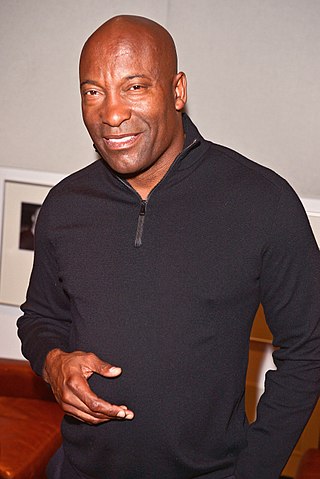
John Daniel Singleton was an American director, screenwriter, and producer. He made his feature film debut writing and directing Boyz n the Hood (1991), for which he was nominated for the Academy Award for Best Director, becoming, at age 24, the first African American and youngest person to have ever been nominated for that award.

John Barry Prendergast was an English composer and conductor of film music.

Hicham El Guerrouj is a retired Moroccan middle-distance runner. El Guerrouj is the current world record holder for the 1500 metres and mile events, and the former world record holder in the 2000 metres. He is the only man since Paavo Nurmi to win a gold medal in both the 1500 m and 5000 metres at the same Olympic Games.
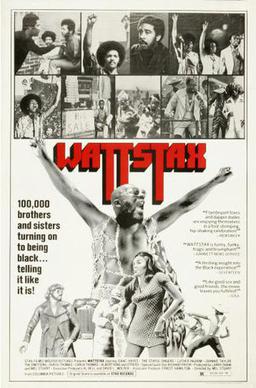
Wattstax was a benefit concert organized by Stax Records to commemorate the seventh anniversary of the 1965 riots in the African-American community of Watts, Los Angeles. The concert took place at the Los Angeles Memorial Coliseum on August 20, 1972. The concert's performers included all of Stax's prominent artists at the time. The genres of the songs performed included soul, gospel, R&B, blues, funk, and jazz. Months after the festival, Stax released a double LP of the concert's highlights, Wattstax: The Living Word. The concert was filmed by David L. Wolper's film crew and was made into the 1973 film titled Wattstax. The film was directed by Mel Stuart and nominated for a Golden Globe award for Best Documentary Film in 1974.
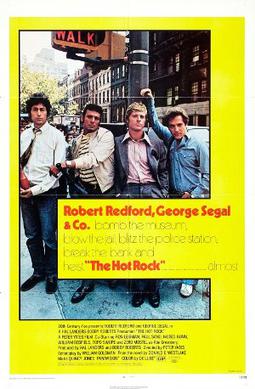
The Hot Rock is a 1972 American crime comedy-drama film directed by Peter Yates from a screenplay by William Goldman, based on Donald E. Westlake's novel of the same name, which introduced his long-running John Dortmunder character. The film stars Robert Redford, George Segal, Ron Leibman, Paul Sand, Moses Gunn and Zero Mostel. It was released in the UK with the alternative title How to Steal a Diamond in Four Uneasy Lessons.
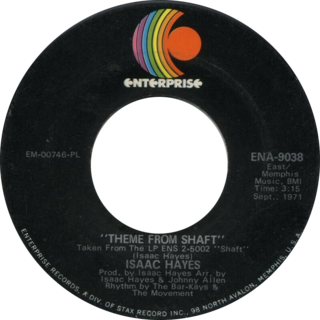
"Theme from Shaft", written and recorded by Isaac Hayes in 1971, is the soul and funk-styled theme song to the Metro-Goldwyn-Mayer film Shaft. The theme was released as a single two months after the movie's soundtrack by Stax Records' Enterprise label. "Theme from Shaft" went to number two on the Billboard Soul Singles chart and to number one on the Billboard Hot 100 in the United States in November 1971, and number one in Canada in December. The song was also well received by adult audiences, reaching number six on Billboard's Easy Listening chart and number four in Canada. The song is considered by some to be one of the first disco songs.
The music of the 2004 TV series Battlestar Galactica is a body of work largely credited to the composers Bear McCreary and Richard Gibbs. The music of Battlestar Galactica displays a variety of ethnic influences and generally does not conform to the "orchestral" style of many science fiction scores.

Vonetta Lawrence McGee was an American actress. She debuted in the Spaghetti Western The Great Silence and went on to appear in blaxploitation films such as Hammer, Melinda, Blacula, Shaft in Africa, Detroit 9000, and 1974's Thomasine & Bushrod alongside her then-boyfriend Max Julien. In 1975, she was Clint Eastwood's co-star in The Eiger Sanction. She was a regular on the 1987 Universal Television situation comedy Bustin' Loose, starring as Mimi Shaw for its only season (1987–88).

The Four Tops are an American vocal quartet from Detroit who helped to define the city's Motown sound of the 1960s. The group's repertoire has included soul music, R&B, disco, adult contemporary, doo-wop, jazz, and show tunes.

Four Tops Second Album is a 1965 R&B studio album by vocal quartet the Four Tops. The album, released on the Motown record label, reached No. 3 on Billboard's Black Albums chart and No. 20 on the Billboard Top LPs chart. The album contains three hit singles. "I Can't Help Myself " reached No. 1 on both the Black Singles and Pop Singles charts, while "It's the Same Old Song" reached No. 2 and No. 5 respectively, and "Something About You" reached No. 9 and No. 19. In 1990, Motown bundled the Four Tops' first two albums together in a release titled Four Tops/Four Tops Second Album.

The 2010 Copiapó mining accident, also known then as the "Chilean mining accident", began on 5 August 2010, with a cave-in at the San José copper–gold mine, located in the Atacama Desert 45 kilometers (28 mi) north of the regional capital of Copiapó, in northern Chile. Thirty-three men were trapped 700 meters (2,300 ft) underground and 5 kilometers (3 mi) from the mine's entrance, and were rescued after 69 days.

Four Tops is the 1965 self-titled debut studio album by the American vocal group the Four Tops. The album was produced and mostly written by the Motown's main writing/producing team Holland-Dozier-Holland. Four Tops includes the singles "Baby I Need Your Loving", "Without the One You Love ", and "Ask the Lonely".

The Impossible Dream is a double compilation album by American pop singer Andy Williams that was released in late 1971 by Columbia Records. Unlike his most recent compilation, Andy Williams' Greatest Hits, this 2-LP set focused exclusively on covers of songs made famous by other artists and included four tracks that had previously only been available on his UK album titled Love Story. In 2003 these tracks were released on the Williams collection from Collectables Records titled B Sides and Rarities.
Brian August Potter is a British-born American pop music songwriter and record producer. With his writing partner, Dennis Lambert, Potter wrote and produced hits songs for the Four Tops, Tavares, the Grass Roots, Hamilton, Joe Frank & Reynolds, Evie Sands, Coven, Hall and Oates, and Glen Campbell. Potter and Lambert were nominated for a Grammy Award for their production on Rhinestone Cowboy.
Are You Man Enough may refer to:
"Are You Man Enough" is a 1973 hit song recorded by the Four Tops for the ABC Records label. It appeared as the second track on the soundtrack to the movie Shaft in Africa. It reached number 2 on the American R&B chart, number 15 on the American Billboard chart in 1973, and number 35 on the Canadian RPM magazine top singles chart. It was subsequently released on their 1973 album, Main Street People and used as the main theme for the film Shaft in Africa. The song was also featured in the 2007 comedy Superbad.

Dennis Earle Lambert is an American musician, songwriter and record producer.

The Music of Johnny Mathis: A Personal Collection is a box set by American pop singer Johnny Mathis that was released in 1993 by Columbia Records and gave an overview of his career with four CDs containing 86 tracks that he selected himself. In the liner notes he wrote that his "undying gratitude is really to the lyricists and composers of all these memorable songs. Without the words and music I have sung over the years, my career as a singer would not have existed. My thanks is always to these special and gifted people."
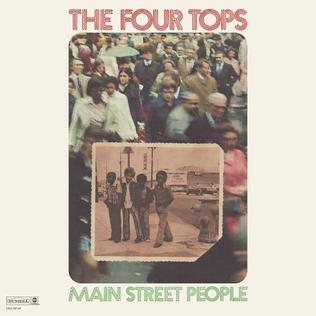
Main Street People is the twelfth album by R&B group the Four Tops, released in 1973. It produced three singles, one of which, "Sweet Understanding Love" was the group's last top 40 single in the US for eight years. The album itself did not enjoy the commercial success the group was used to: 'Main Street People didn't do near what it should have done,' Abdul Fakir said in 1982, 'considering the quality of the material.'
















